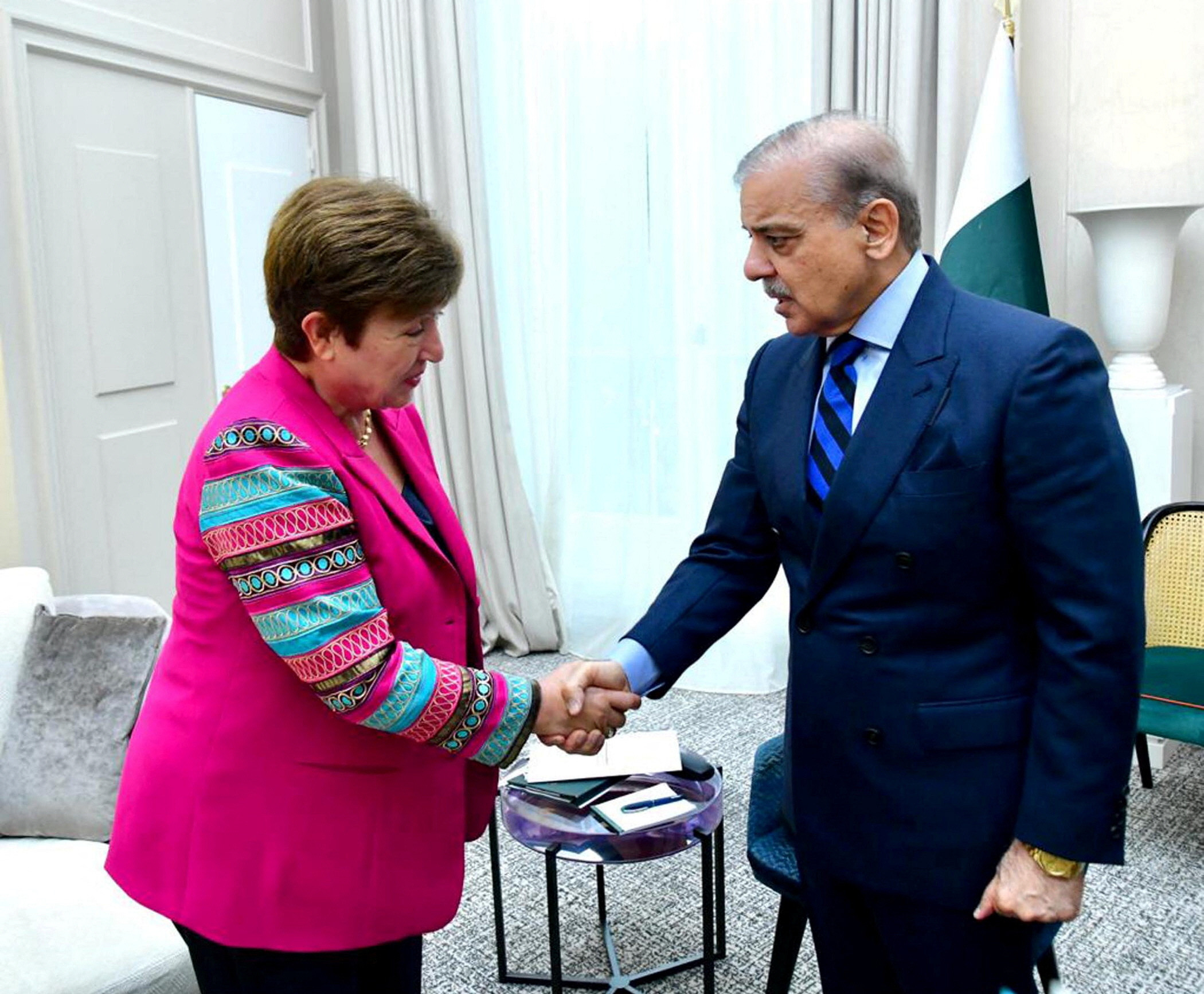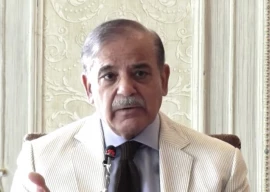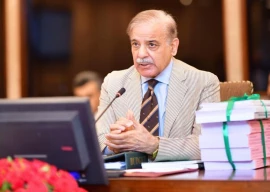
International Monetary Fund (IMF) Managing Director Kristalina Georgieva on Thursday urged Prime Minister Shehbaz Sharif to resolve policy differences at the global lender’s staff level, triggering yet another round of talks in Islamabad on an urgent basis.
The meeting between PM Shehbaz and Georgieva took place on the sidelines of the New Global Financial Pact summit held in Paris, France.
The only major positive outcome of the meeting in Paris was that the officials in Islamabad went back to the drawing board and again started talking with the IMF staff to minimise the differences, according to sources in the finance ministry.
The Pakistani authorities privy to the discussions told The Express Tribune that the IMF managing director did not immediately concede to the demand by PM Shehbaz for a board meeting date for the approval of the 9th review and the release of the third last loan tranche of $1.2 billion.
Instead, she emphasised that all the policy matters should be resolved at the IMF staff level, the officials added.
A member of the federal cabinet joined from Paris the technical round of talks, which took place in Islamabad after the meeting between the IMF MD and the PM.
Both sides again discussed all the outstanding issues and the government appeared accepting the IMF’s views on a few budgetary numbers, the officials said.
They continued that another round of talks might take place soon.
It was the second time in less than a month that PM Shehbaz directly talked to the IMF MD in addition to sending her at least three letters.
The meeting took place a week before the expiry of the current four-year long programme ending on June 30.
These top-level contacts have not yet helped to break the deadlock, as under the IMF charter, the managing director does not have the extraordinary authority to override the staff concerns in a case of deep mistrust, according to the people having knowledge of the global lender’s working.
“If the country has a reasonable track record and only one or two relatively minor things are holding up the agreement, the IMF management is likely to be more sympathetic to finding a compromise,” Murtaza Syed, former deputy governor of the State Bank of Pakistan and also an ex-IMF official, said.
Murtaza added that if the lack of trust or a gulf between the lender’s team and the authorities was large and wide-ranging, the IMF management was typically less willing to intervene.
He said the possibility for Pakistan reaching a pact with the IMF remained but the bar for doing so was “high”.
The trust deficit between Pakistan and the IMF was deeper and wider and it could only be resolved first at the staff level, according to the sources.
A statement issued by the PM Office after the meeting read that the premier said Pakistan had completed all the prior actions for the 9th review.
However, the IMF MD shared “her institution’s perspective on the ongoing review process”.
The prime minister outlined the steps taken by the government for economic growth and stability, according to the statement.
“The PM underscored that all prior actions for [the] 9th Review under the Extended Fund Facility (EFF) had been completed and the government of Pakistan was fully committed to fulfilling its obligations as agreed with the IMF,” it added.
“The managing director of the IMF shared her institution’s perspective on the ongoing review process,” the statement added.
The statement noted that the meeting provided a useful opportunity to take stock of the progress in that context.
Recalling their recent telephonic conversation on May 27, 2023, the prime minister informed Georgieva of Pakistan’s economic outlook.
“The prime minister expressed the hope that the funds allocated under the IMF’s EFF would be released as soon as possible,” the statement read.
PM Shehbaz said the release of the funds would help strengthen Pakistan’s ongoing efforts towards economic stabilisation and bring relief to its people.
Of $6.5 billion, Pakistan has not yet received the amount of $2.6 billion because of the incomplete 9th, 10th and 11th reviews of the bailout package.
After the meeting, both the PM and the IMF MD also exchanged views on Twitter.
“Very pleased to meet [the] Pakistan PM on the margins of the Paris Summit. We had a fruitful discussion ... on how the IMF can continue to work closely with Pakistan on policies to maintain macroeconomic stability and advance inclusive growth for the Pakistani people,” Georgieva tweeted.
In response, PM Shehbaz described the encounter as a “productive exchange of views”.
“Though all prior actions for the 9th review have been completed, we are willing to take further steps jointly with the IMF,” the premier wrote on Twitter.
PM Shehbaz further stated that Pakistan keenly looked forward to the IMF board’s approval for the 9th review at the earliest.
The Paris meeting was also attended by Federal Economic Affairs Minister Sardar Ayaz Sadiq and Minister of State for Finance and Revenue Aisha Ghaus Pasha.
This week, PM Shehbaz also met with nearly a dozen foreign ambassadors and informed them that in February, the country undertook all the agreed steps, including imposing a mini-budget worth Rs170 billion, increasing electricity and gas tariffs, hiking the interest rate and leaving the currency exchange at the market forces, according to the officials.
The only outstanding issue was the external financing gap which, according to the finance ministry, was also settled on May 27 during a telephonic conversation between the prime minister and the IMF managing director.
Contrary to the Pakistani authorities’ claims, there are gaps between the positions taken by Pakistan and the IMF staff, particularly on the issue of the amendments to the proposed budget, hike in the monthly stipend of the Benazir Income Support Programme, increase in petroleum levy rates and correction in the foreign currency market.
The IMF is also not very pleased with the directions of the monetary and exchange rate policies.
One of the participants of the Paris meeting claimed that unlike the previous encounter, the managing director appeared positive and she also showed the intention to complete the 9th review.
However, the IMF staff has expressed concerns over the proposed budget and identified a gap of about Rs550 billion to Rs600 billion, which the government would have to plug to the satisfaction of the global lender.
The IMF has also objected to the $100,000 tax amnesty scheme.
The global lender has asked the government to increase the petroleum levy by Rs10 to Rs60 per litre.
The IMF also wants the provinces to provide iron-clad guarantees for generating cash surplus.

1724668524-0/Untitled-design-(5)1724668524-0-405x300.webp)







1732011525-0/Express-Tribune-(8)1732011525-0-270x192.webp)











COMMENTS (1)
Comments are moderated and generally will be posted if they are on-topic and not abusive.
For more information, please see our Comments FAQ